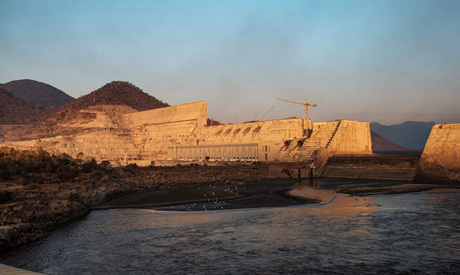
the Grand Ethiopian Renaissance Dam
Sudan’s Minister of Irrigation Yasser Abbas said his country’s proposal of a wider international mediation on the Grand Ethiopian Renaissance Dam (GERD) talks is the result of the ineffectiveness of the former approach to negotiations and disallowing experts to effectively help Egypt, Sudan, and Ethiopia reach common ground.
In an interview with the Egyptian private newspaper Al-Shorouk, Abbas said the Sudanese proposal to form an international mediation quartet that includes the United Nations, the United States, the African Union, and the European Union will change the role of these parties from observers to mediators.
This process shall help Egypt, Ethiopia, and Sudan reach a legally binding agreement on the filling and operation of the massive dam, in a way that secures the interests of the three countries and address their concerns, Abbas added.
Sudan has been the most harmed due to the failure of the three countries to reach an agreement, which is why it has been keen to find other ways to involve observers in the GERD mediation process, Abbas said, adding that parties in the quartet are aware of the details of previous negotiations.
The UN has been suggested to join the new mediation efforts due to its role in representing other nations, Abbas said.
Filling GERD without an agreement between the three countries constitutes a direct threat to the lives of more than 20 million Sudanese people living along the banks of the River Nile, from Roseires to Atbara, Abbas said.
The absence of an agreement on the filling and operation of GERD as well as a regular exchange of information will negatively affect the operation and safety of Sudan’s Roseires Dam, the storage capacity of which does not exceed 10 percent of that of GERD and lies less than 100 kilometres away from it, Abbas explained.
He said he hopes the African Union, currently chaired by DR Congo, will adopt the new Sudanese proposal of international mediation.
Rounds of talks among the three concerned countries in the GERD issue have ended in deadlock, with Sudan dismissing the way talks recently held as “unproductive” and with Egypt blaming the stalemate on Ethiopia’s intransigence.
The reason why Ethiopia opposes a binding agreement is that the country attempts to involve articles on water sharing in the GERD deal, which have not been part of the negotiation terms or the Declaration of Principles signed by the three countries in 2015.
The contentious technical points with Ethiopia are related to the systems and mechanisms of filling, and operating the dam, the exchange of information and the ways of dealing with the consecutive and extending years of drought, Abbas said.
He added that such outstanding points are limited and can be agreed upon whenever good intentions and the political will are present.
Egyptian President Abdel-Fattah El-Sisi and Sudanese Prime Minister Abdalla Hamdok exchanged visits over the past two weeks. The visits focused on unifying the two countries’ positions on GERD, including the endorsement of the Sudanese proposal of an international quadripartite committee to mediate the GERD talks.
Short link: